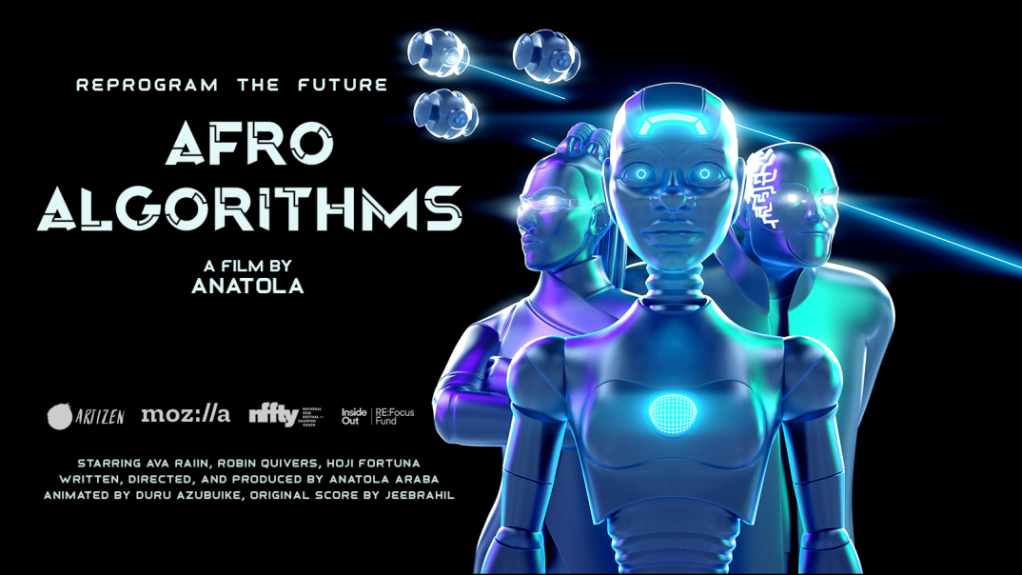Animated Short ‘Afro-Algorithms’ Explores A New Vision Of Combatting Bias In Technology
Source: Mozilla / Mozilla
The short animation “Afro-Algorithms” turns traditional science fiction on its head, merging the political and the creative in a conversation about race technology and envisioning new futures. Written and directed by Anatola Araba, “Afro-Algorithms” is a visually stunning exploration into alternatives to addressing algorithmic bias.
“Afro-Algorithms,” tells the story of Aero, the world’s first leader of artificial intelligence. Through a brief exploration, Aero learns her programming is incomplete and goes on a journey to fill in the missing pieces of data. She finds help from an unexpected source and fills in the gaps in the data initially excluded by her creator.
Araba told NewsOne that “Afro-Algorithms” took many different forms before she finally settled on 3-D animation.
“Anything is really possible with animation,” she said. “Animation let me bring to light the visions in my mind that were so otherworldly. Like the location taking place in a very futuristic city that floats in the middle of the air or the enchanted forest that Aero goes in the project.”
Source: Sosie Almasian / Sosie Almasian
Working with 3-D animation also made it easier to have a remote team. Spanning the globe, Araba’s team included Nigeria-based Duru Azubuike as the lead 3D animator and South African art direct Nkosana Ngwenya as the 3D environment artist. Voicing Aero, the world’s first AI leader, is singer and songwriter Ava Raiin. Robin Quivers and Hoji Fortuna round out the cast.
Taking a creative approach to the conversation, Araba said it was important to envision new ways forward to end bias and discrimination in technology. In under 15 minutes, Aero learns the value of different forms of information and experiences that can shape decision-making.
“I wanted to take this real-life data and essentially say that we can’t use the data of the past to build the future,” Araba explained. “We have to try to imagine the future we want to have and then work towards that.”
Winner of the Mozilla Foundation‘s 2021 Creative Media Award, Araba drew inspiration from many sources, including the Netflix Documentary’ Coded Bias’ and transmedia artist Stephanie Dinkins. Coming full circle, Dinkins moderated a panel about the film Thursday at MozFest.
Source: Mozilla / Mozilla
Araba described the impact of viewing Dinkins’ exhibit and reading the book “Weapons of Math Destruction.”
“That body of writing is what opened my mind to the fact that sites like Google, or just the big technology companies, that a lot of people see as just a neutral place were actually perpetuating stereotypes specifically against Black and Brown people,” Araba explained.
From search engine bias to issues with facial recognition software, technology bias impacts daily lives in many ways.
“Just by typing something in about Black hair and seeing things that don’t reflect the reality, or typing in beauty and not seeing people with darker skin tones,” she continued. “That’s actually a reflection of bias. Both in our society but also embedded into the algorithms themselves.”
Araba also talked about the limitations of data without understanding the context of how it is used in making decisions. A common example that has made headlines in recent years involves Black maternal health.
But Araba says that expanding the possibility of new futures begins with embracing the tool of imagination.
“Imagination is the greatest tool of humanity,” she said. “And I wanted to incorporate that into the film because if Aero just used the data that she was given, she would just perpetuate the history of bias and discrimination and othering that the past shows us into the future that she is trying to lead.”
Ultimately, Araba’s animation offers an understanding of data and technical knowledge that appreciates multiple information sources to improve humanity.
“The moral of the story of ‘Afro Algorithms’ is trying to not use what currently exists as a roadmap to what is possible but to imagine the world we want to live in, and then work to bring that into existence,” she said.
SEE ALSO:
Netflix’s ‘Coded Bias’ Documentary Uncovers Racial Bias In Technology

